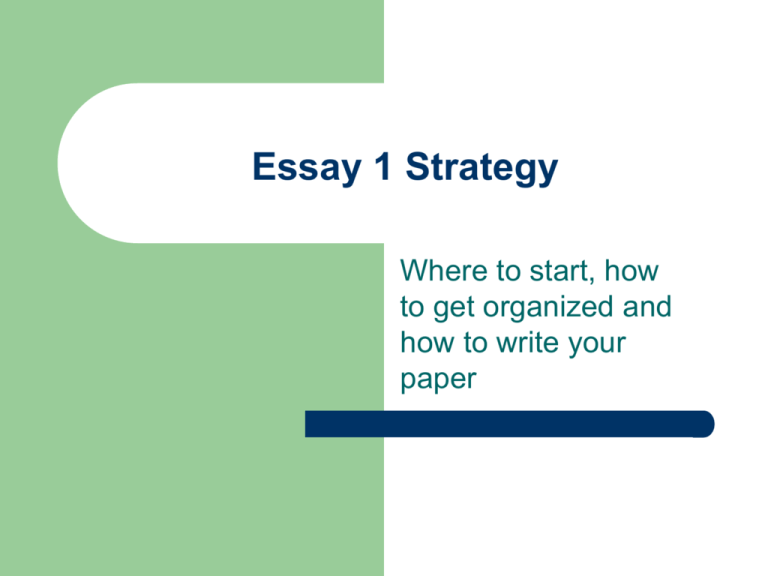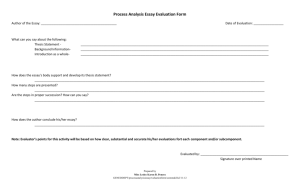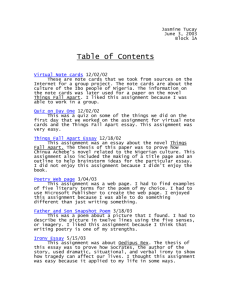Essay 1 Strategy
advertisement

Essay 1 Strategy Where to start, how to get organized and how to write your paper Step 1 – Deciding on your poem As you choose your poem, make sure you pick one where there is a strong speaker. Oftentimes, it is easier to identify speaker in a poem with a strong “I” presence. Step 2 – Reading and Notetaking Mark parts of the poem that are important with a highlighter or jot down notes in the margin as you read the poem. Notes areas where the same types of symbols are being used (such as the references to kingship or royalty in “Richard Cory”) Your notes in your text will help you when you begin writing your essay. Step 3 – More Reading Don’t be satisfied with one reading of the poem. Read it again and again. Spend some time away from the poem Read it again. Step 4 – Breaking it down This essay is an analysis, which comes from the Greek “breaking up.” How do the elements of the poem help to reveal the speaker? Use the questions in the text to help you when analyzing the elements of the poem. Step 5 – Deciding on a thesis Sum up your controlling idea, your thesis, in one sentence. Usually, this sentence will be placed at the end of the introduction. Don’t just write down a lot of random impressions about the poem. Give your impressions shape and form. Make one point strongly. Stick to ideas that are related to your thesis. Step 5 – Thesis Consider a thesis similar to the one in the textbook for Elizabeth Bishop’s “Manners.” – Bishop enriches this poem about manners by developing an implicit theme through her subtle use of such elements of poetry as speaker, setting, rhyme, meter, symbol and images. Step 5 -- Thesis A similar thesis could be constructed for Mew’s “The Farmer’s Bride.” – Mew’s farmer shows his true character through the depiction of his relationship with his wife, figures of speech and imagery. Step 5 – Thesis Another option would be to use the thesis to outline specific traits of the speaker. – Robinson’s “Miniver Cheevy” reveals a weak man who longs for the past and seems unable to take his fate into his own hands. You also could use the elements of poetry in this thesis: – Robinson uses careful diction, figures of speech and allusions to reveal a weak man who seems unable to take his fate into his own hands. Step 6 – Creating an outline Use your thesis to help you create an outline for your essay. Your body paragraphs might be shaped around personality characteristics of the speaker or elements of poetry and what that element reveals about the speaker. The outline you turn in should have a complete sentence thesis and phrases for the major headings. Step 7 – Writing your essay Create an original title that either uses the name of the poem and author or suggests what the essay will be about. Titles should be centered. – Robinson’s Misfit: “Miniver Cheevy” Step 7 – Writing Mention the author and the title of the poem early in the introduction. – Sometimes people are unable to accept or make the best of what their lives have become. They wallow in their misery and seem unable to control their own destinies. In “Miniver Cheevy,” Edwin Arlington Robinson paints a picture of a man who is unhappy with his life. The poem, written in 1910, is one of a series of Robinson’s Tilbury Town poesm of disillusioned misfits. Based on Gardiner, Maine, the town of his youth, Tilbury Town became the mythical location for many of Robinson’s well-known poems (Henderson 542). Robinson’s “Miniver Cheevy” reveals a weak man who longs for the wealth of the past and seems unable to take his fate into his own hands. Step 7 – Writing the essay Avoid using “I” in your essay. The essay comes from you, so unless otherwise noted, the reader assumes that the essay is your opinion. You also should avoid using “you” in essays. “You” is considered familiar and, therefore, has no place in a formal essay. Formal essays should use the third person (see Hacker). Step 7 – Writing the essay Present tense is used when discussing literature. Robinson paints or Robinson reveals. When discussion historical events or incidents in the author’s life, though, use the past tense. Step 7 – Writing the essay Use frequent references to the poem itself to support your thesis and topic sentences. Remember, though, that no more than 15 percent of any essay should be direct quotes. Use MLA style to document where you have used the poem. Step 7 – Writing the essay Make sure your conclusion effectively wraps up the essay. Avoid just restating your introduction.






